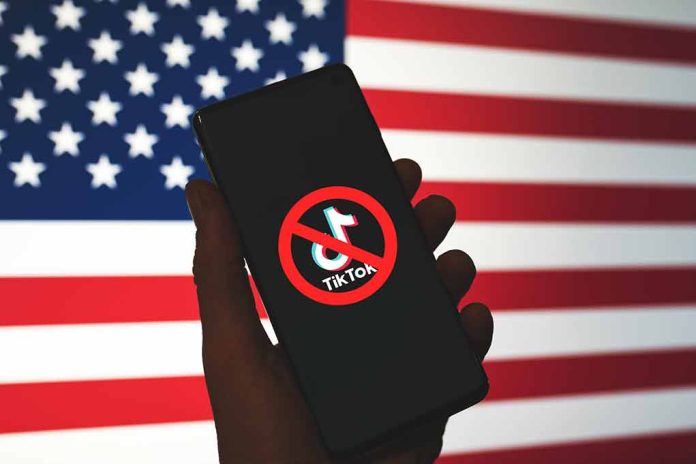
TikTok faces potential US ban as national security concerns intensify, with a January 19 deadline looming for its Chinese parent company to sell or face shutdown.
At a Glance
- TikTok could be banned in the US unless ByteDance sells by January 19
- US officials cite national security risks due to ByteDance’s alleged links to Chinese government
- The ban would make TikTok unavailable in US app stores, eventually rendering it unusable
- TikTok and ByteDance deny government links and have filed legal challenges
- President-elect Trump has asked the Supreme Court to pause the law for a “political” solution
TikTok’s Uncertain Future in America
The popular video-sharing app TikTok is facing a potential ban in the United States, as concerns over national security and data privacy reach a critical point. The US government has given ByteDance, TikTok’s Chinese parent company, until January 19 to sell the app or face a nationwide shutdown. This ultimatum stems from a law passed in April 2024, known as the Protecting Americans from Foreign Adversary Controlled Applications Act (PAFACA), which allows the government to ban foreign-owned apps deemed a threat to national security.
The US Justice Department has labeled TikTok “a national-security threat of immense depth and scale,” citing ByteDance’s alleged connections to the Chinese government. Officials fear that TikTok could be coerced into sharing sensitive user data with Beijing, a claim that both TikTok and ByteDance vehemently deny. The companies have filed legal challenges against the law, arguing that it is unconstitutional and violates free speech rights.
U.S. TikTok ban | What users can expect and if there is a way around https://t.co/7ZRUSPtbKe
— 13News Now (@13NewsNow) January 14, 2025
Implications of the Ban
If the ban proceeds, TikTok would become unavailable in US app stores, preventing new downloads and updates. This would eventually render the app unusable for American users. The law targets not only TikTok but also companies that make it accessible in the US, such as app stores and cloud service providers.
“On January 19th, as I understand it, we shut down,” TikTok lawyer Noel Francisco stated, highlighting the severity of the situation.
The potential ban could have far-reaching consequences for TikTok creators and small businesses that rely on the platform. Jess Maddox, an expert on social media influencers, warns, “A TikTok ban would be absolutely catastrophic for the creators and the small businesses who rely on it. I’ve spent my career talking to creators and influencers, they are resilient, they’ll pivot, but it will be a struggle in the meantime and take a hit to them financially.”
Political Implications and Possible Solutions
The ban’s implementation coincides with the end of President Biden’s term, going into effect the day before President Trump takes office. Interestingly, Trump has recently defended TikTok, asking the Supreme Court to pause the law to allow for a “political” solution. This marks a shift from his previous opposition to the app during his first term.
“Even as the application degrades on your phone, you may still be able to access it through a virtual private network on a web browser,” suggests technology expert Kate Ruane, highlighting potential workarounds for users if the ban takes effect.
One possible solution being explored is “Project Texas,” which would involve Oracle hosting US user data and overseeing data flows to ensure compliance with the law. This approach could potentially address security concerns while allowing TikTok to continue operating in the US market.
As the January 19 deadline approaches, all eyes are on the Supreme Court and the incoming administration. The outcome of this high-stakes situation will not only determine the fate of TikTok in the US but also set a precedent for how America deals with foreign-owned technology companies in an era of increasing digital sovereignty concerns.






















